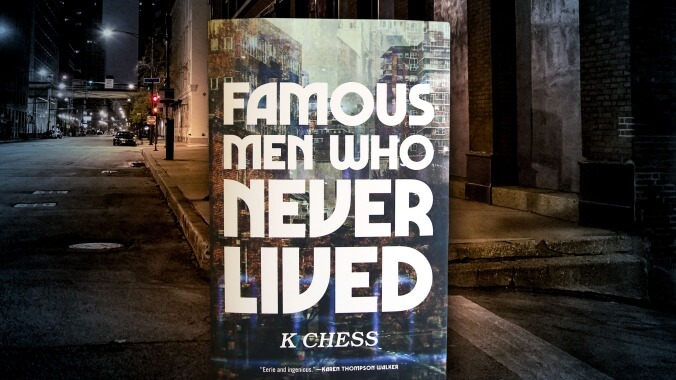Famous Men Who Never Lived uses an alternate universe to tell a very real refugee story
Aux Features Book Review
Stories about alternate universes are often focused at the individual level, exploring how people react to learning about or meeting versions of themselves who have made different decisions or been shaped by different events. But K Chess’ debut novel, Famous Men Who Never Lived, provides a macro perspective on the science fiction trope, using it to examine the plight of refugees and how they adjust and integrate in a new home that can be simultaneously familiar and strange.
Famous Men Who Never Lived primarily follows Helen Nash and Vikram Bhatnagar, who are among 156,000 people who fled to our version of New York City three years ago after a series of terrorist attacks triggered a nuclear disaster in their world. The two universes began diverging in the early 1900s, and while people born before that time had equivalents in both worlds, the modern refugees don’t. Instead they’re left navigating a New York in the way so many immigrants have before, struggling to find a way to move forward with their lives while coming to terms with everything they’ve left behind.
Hel takes this transition especially hard. A white woman who worked as a surgeon in her world, she learns for the first time what it’s like to be part of a minority that many hate and fear. Labeled “Universally Displaced Persons,” but called “aliens” by their critics, the group faces the condemnations that have long existed but become louder and more vicious in Donald Trump’s America. Crimes committed by UDPs are sensationalized and used as evidence that the entire group is unstable. Americans say that the refugees are simultaneously taking jobs and draining money by living on public assistance. While many of the refugees have professions that can’t easily be translated in their new world because of divergent technology, Hel could regain her medical license but feels too traumatized to return to any semblance of her old life. She faces criticism from otherwise tolerant people for her failure to adjust to her new life and nostalgia for the world she left behind.
“You seem to have these two beliefs that are in fundamental conflict,” says a museum curator who Hel approaches about doing an exhibit on UDP culture. “That everything is worse here than it was where you came from. And that everything’s easier for us—that we’re all soft and we don’t know about danger. Which is it?”
Hel comes to believe that the first divergence between the two worlds might have been the early death of Ezra Sleight, who would go on to become a famed science fiction author in the vein of Ray Bradbury in her own world. Vikram, a literature scholar who specialized in Sleight’s work, brought over a copy of the author’s most famous book, The Pyronauts, and excerpts from the bleak post-apocalyptic tale serve as a story within a story. The novel is also punctuated with interview transcripts that provide snippets from the lives of other UDPs, which lets Chess flesh out her refugee metaphor and the differences between the worlds. There’s a young man who loved the tattoo of a Buddhist good luck symbol on his neck until he fled to our Earth where the swastika has a very different meaning. There’s a woman who became so exasperated with how people reacted to hearing about the differences in their worlds that she began inventing tales to make her people seem as backward as possible. There are UDPs from various races and religions puzzling out how they’re viewed in a world shaped by fundamentally different geopolitical forces.
Chess is less interested in examining those big political shifts and more focused on developing a host of small ones. Famous Men Who Never Lived is a linguistic feat, as the author invents curses, slang, and a name for drugs that manage to feel authentic by virtue of just being a bit removed from the versions commonly used now. Those join fun touches like a musician who tries to pass off the music from the UDPs’ equivalent of The Beatles as his own, helping to bring levity to prose that focuses on the heavy subjects of survivor’s guilt, trauma, and the healing power of art.
Famous Men Who Never Lived more closely resembles Behold The Dreamers, Imbolo Mbue’s novel about a Cameroon family navigating life in New York, than other works of alternate-reality science fiction like the television series Fringe. There’s little action and few explanations of the science that makes the plot possible. Like its imagined anti-colonialist narrative, The Pyronauts, or Bradbury’s Fahrenheit 451, Famous Men Who Never Lived is science fiction executing its classic purpose of using a disturbing vision of the future to examine the real problems of the present.
7 Comments
Will you remember the famous men / Who had to fall to rise again?
Just pick yourself up!
Dust yourself off!
Start all over again!
Sounds like a cross between Alien Nation and the recently cancelled (boo) Counterpart. I like the idea that they’re from an alternate reality and not from the future like the Crossing on ABC.
Boo, this doesn’t seem to have a UK release, meaning Amazon is pretty much the only way to get it.
Is that the KISS font on the cover
I can’t wait to read this
Crimes committed by UDPs are sensationalized and used as evidence that the entire group is unstable. So Fixed News and Synced-Liars stations are anti-UDP as well as anti-PoC? Who-da-thunk?!But the book sounds great! Just remember, Ms. Nelson, that when you and Ms. Chess get together to move this to the screen, that a serialized version will likely be much better than an attempt to cram everything into a 2 1/2 or 3 hour movie.